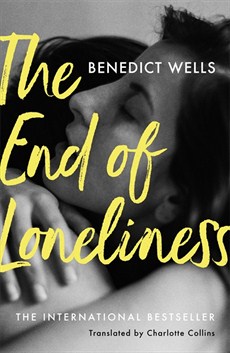‘All I wanted to do with that book was to ask questions,’ Benedict Wells told the audience as he launched the English version of his novel, 'The End of Loneliness'. We were fortunate enough to talk to the bestselling author and his translator Charlotte Collins and to ask a few more.
What is The End of Loneliness about?
Benedict: My first three books were somewhat more humorous. This time, I wanted to examine some experiences which have been formative for me – loss, loneliness and change – with as much seriousness and passion as I could muster. I drew on my own life experience and wrote a story that never happened to me and that is fictional, but is very much based upon real emotions. I wanted to use the story to share a feeling that I have had with my readers – an almost unspeakable feeling, but one which I am compelled to try and communicate.
What characterises your writing?
Benedict: English-speaking authors have always interested me most. My heroes and role models have always been authors like Kazuo Ishiguro, Carson McCullers, John Irving and John Green. They have shaped me and my writing. I revel in that kind of storytelling, which is deep, entertaining and artful at the same time. I prefer shorter books, such as Stoner by John Williams, which captures the whole spectrum of life in only 280 pages while also entertaining the reader.
Charlotte, you have done one of the closest readings possible of The End of Loneliness. What defines Benedict’s writing style for you?
Charlotte: It’s not really about his style, but I think the thing that really struck me and impressed me when I first read it was that he is quite a young writer and he doesn’t write like a young man. He writes like someone with a lot more life experience and wisdom than you would anticipate, and the book is very carefully edited by him. He knows exactly what he wants to say and how to say it. That was a joy to translate.
Did you collaborate on the translation?
Benedict: I met Charlotte once and she sent me a lot of questions, exploring what exactly I was trying to communicate in specific passages of the novel. And after reading the English version I asked her quite a few questions too. It was a close collaboration and I am very enthusiastic about her work. She did a fantastic job and I feel very lucky that she translated the book.
In 2016, Vom Ende der Einsamkeit won the European Union Prize for Literature. Do you think that awards and similar kinds of support are necessary for literature to be successful abroad?
Benedict: I think the European Union Prize is especially important for smaller European languages, because it promotes translation. That is, translations of the book are supported by the European Union. The prize was an incredible blessing for me because it simply opened a lot of doors. And for a young author – which I still kind of am – being translated into so many languages is of course a privilege. For so many years I was unable to give my books to friends abroad because they weren’t able to read them.
Charlotte: It’s certainly much easier for the publisher if there’s funding available from another source, also because they are taking a risk when they are buying a book that they aren’t able to read themselves. And obviously, the ones that win awards, the ones that get publicity, the ones that get a lot of reviews in the country of origin, are more likely to be noticed and picked up by the publishers here. I think what’s problematic sometimes is that you often find there are lots of fantastic, smaller books that don’t get pushed as much. And I think a lot of what we as translators do is finding the less obvious books, the ones that UK publishers might not have heard of. We are scouting and advocating for the literature of our respective languages.
Benedict, you were twenty-four when your first novel was published. Do you have any tips for young writers?
Benedict: One thing I can definitely say is that you cannot work hard enough. That’s the most important thing. Writing is a self-tormenting process and you need to find critical readers – ones who don’t just tell you that the book is constantly getting better, but are prepared to say that the beginning is boring or badly written. They should dare to get in your way. And at the same time I’d say you should read as much as you possibly can. Ask yourself why a particular book begins to captivate you on page five and if yours does not, analyse where you might be going wrong. I have always tried to compare my own writing to the books I like and value and this allows me to see where the differences are. I think that’s the only way to progress. There’s this famous saying: if better is possible, good is not enough. I believe that’s absolutely true for writing. And even if you keep pushing yourself to improve, there is no guarantee of anything great at the end of it all, but at least you have done the best you could.
Is there anything you are working on at the moment?
Benedict: My next novel is almost complete, but I’ll hang on to it for another two or three years. I want to keep working on it until the end and enjoy it. As a young author I was too impatient and published my books too soon. I won’t let that happen again. I worked on The End of Loneliness for seven years.
Charlotte: I’ve got a couple of books lined up now, which I am looking forward to getting started with. I am about to start work on The Club by Takis Würger, which has done really well in Germany.


